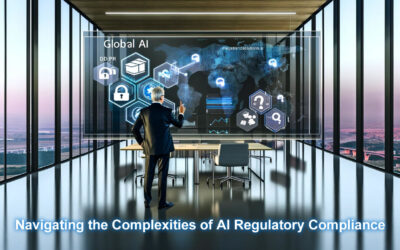The fears surrounding Artificial Intelligence (AI) among those who may not be fully informed often revolve around several key areas. Understanding these fears can help AI-powered businesses tailor their communication and policies to reassure their customers effectively. Here’s a rundown of common fears and strategies businesses can use:
Common Fears about Artificial Intelligence
- Job Displacement: There’s a widespread concern that AI and automation will lead to significant job losses as machines replace human labour. Automation isn’t just about replacing jobs; it’s about shifting the nature of work. AI can take over mundane tasks, freeing humans for creative and strategic roles.
- Loss of Privacy: People worry that AI systems, particularly those involving surveillance and data analysis, could intrude on personal privacy. Businesses should secure data and ensure it’s used ethically. Transparent practices around data use can turn privacy concerns into customer confidence.
- Bias and Discrimination: There is a fear that AI systems might perpetuate or even exacerbate biases present in the data they are trained on, leading to unfair discrimination. Continuously refining AI with diverse data sets and perspectives can reduce biases. Inclusivity in AI’s development phase is crucial for fair and unbiased outcomes.
- Lack of Control and Accountability: Concerns that as AI systems become more autonomous, it might be hard to control them or hold anyone accountable for their actions. Establishing oversight mechanisms and ethical guidelines for AI deployment ensures that technology enhances, rather than undermines, human decision-making and accountability structures.
- Misinformation: AI can spread misinformation online, especially through the use of deepfakes and other forms of synthetic media. However, AI can also be a tool for identifying and mitigating misinformation. Businesses should work on AI-driven solutions that enhance information reliability and credibility online.
- Depersonalisation: Fears that AI, by automating interactions, could lead to a loss of personal touch in services and relationships. AI should enhance personalisation, not detract from it. By understanding individual preferences and behaviours, AI can offer more tailored and meaningful experiences.
- Existential Risks: Although more speculative, there’s a fear that AI could pose existential risks to humanity, especially if it were to surpass human intelligence in an uncontrolled manner. Promoting global cooperation and ethical standards can mitigate existential risks. Open dialogues about AI’s long-term impact are essential for responsible development and use.
What AI-Powered Businesses Can Do
- Transparency: Be open about how AI systems are used, including what data is collected and how decisions are made. This can help demystify AI and reduce fears of the unknown. Detailed explanations of AI processes can demystify technology for consumers. Sharing success stories of AI solving real-world problems can further enhance transparency’s impact.
- Privacy Assurance: Implement and communicate strong data protection measures. Assure customers that their data is handled responsibly, with clear opt-in policies and robust security. Demonstrating a commitment to privacy beyond legal requirements can distinguish a business. Engaging in third-party audits of data practices can enhance trustworthiness.
- Bias Mitigation: Regularly audit AI systems for bias and take corrective action. Communicating these efforts to the public can help build trust. Publicly sharing the outcomes of bias audits and the steps taken to address issues can demonstrate a business’s commitment to fairness and equity.
- Human-Centric Design: Emphasize that AI augments human abilities, not replaces them. Highlight the roles that AI plays in creating new job opportunities and improving work conditions. Highlighting stories where AI has augmented human capabilities in the workplace can illustrate the positive, transformative potential of AI in enhancing human productivity.
- Accountability: Establish clear lines of accountability for AI’s decisions and actions. Ensure there are mechanisms for redress if AI causes harm. Creating clear channels for feedback and complaints regarding AI’s decisions helps ensure that grievances are heard and addressed, reinforcing a culture of accountability.
- Education: Offer educational resources to help customers understand AI better. Knowledge can dispel fear, turning scepticism into informed curiosity or even enthusiasm. Providing accessible, engaging educational content about AI can demystify the technology for the public, turning apprehension into appreciation and support for AI innovations.
- Ethical Standards: Adhere to high ethical standards in the development and deployment of AI. Participate in industry-wide efforts to establish and maintain ethical guidelines. Leading by example in ethical AI use and advocating for industry-wide standards can position a business as a trusted authority in the AI space.
At Megatrend Solutions, we have the knowledge and expertise to develop custom AI solutions tailored to your business’s unique needs and challenges. By prioritising transparency, privacy, and ethical AI use, we aim to enhance your operations and build and maintain trust with your customers.
We understand the importance of addressing common fears about AI, from job displacement to existential risks. We work closely with you to create AI applications that are not only effective but also responsible and reassuring to your customer base.
Together, we can navigate the complexities of AI integration, ensuring that your business thrives in an AI-enhanced future and leads the way in mitigating customer apprehension through thoughtful, ethical, and transparent AI solutions.





